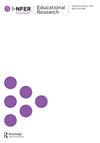向高等教育过渡:学生的期望和现实
IF 2.6
3区 教育学
Q1 EDUCATION & EDUCATIONAL RESEARCH
引用次数: 0
摘要
摘要背景从学校到高等教育的转变涉及学术问题、动机和身份适应等多重挑战。在这种情况下,家庭、同伴和机构的作用对于过渡进程的成功可能是至关重要的。我们通过研究学生对高等教育期望的看法与遇到的现实情况,确定他们面临的主要挑战,并分析用于应对适应高等教育所遇到的困难的策略,试图加深我们对过渡现象的理解。这是一项后续访谈研究,调查了14名智利一年级和二年级的高等教育学生的看法,他们两年前在中学时参加了之前的研究。访谈数据采用定性方法进行分析。分析发现,学生的期望与高等教育头两年发生的事情之间存在差异。与学业困难相关的是,学生们认为主要的挑战包括内容的复杂性增加、时间管理和学习策略。为了应对这些挑战,有证据表明,学生们调整了他们的学习策略,并强烈依赖他们的家庭和同龄人。我们的研究结果引起了人们的注意,即一旦学生转入高等教育,他们所面临的期望和现实之间可能会出现不匹配。对机构的影响包括在中等教育和高等教育之间建立过渡桥梁,而不仅仅是提供有关资金或劳动力市场的信息。在支持成功过渡方面,学术需求、学习时间、学习策略以及与高等教育学院员工和同事的熟悉程度等问题都是需要考虑的相关方面。本文章由计算机程序翻译,如有差异,请以英文原文为准。
Transitioning to higher education: students’ expectations and realities
ABSTRACT Background The transition from school to higher education (HE) involves multiple challenges including academic issues, motivation and identity adaptation. In this scenario, the role of family, peers and institutions can be fundamental in the success of the transition process. Purpose We sought to deepen our understanding of the transition phenomenon by studying students’ perceptions on HE expectations versus the reality encountered, identifying the main challenges they faced and analysing the strategies used to cope with the difficulties encountered in adjusting to HE. Method This is a follow-up interview study that examined the perceptions of 14 first- and second-year HE students in Chile, who had participated in a previous research study two years earlier whilst in secondary school. Interview data were analysed using a qualitative approach. Findings The analysis identified contrasts between students’ expectations and what occurred during the first two years of HE. Associated with academic difficulties, the students felt that the main challenges included increased complexity of content, time management and study strategies. To cope with these challenges, the evidence suggested that the students adapted their academic strategies and relied strongly on their families and peers. Conclusions Our findings draw attention to a mismatch that can occur between the expectations and the reality that students face once they have transitioned to HE. Implications for institutions include building a transition bridge between secondary and postsecondary education, which goes beyond providing information about funding or the labour market. In terms of supporting successful transition, issues such as academic demand, studying time, study strategies and prior familiarity with HE staff and peers are all relevant aspects for consideration.
求助全文
通过发布文献求助,成功后即可免费获取论文全文。
去求助
来源期刊

Educational Research
EDUCATION & EDUCATIONAL RESEARCH-
CiteScore
4.00
自引率
2.90%
发文量
0
期刊介绍:
Educational Research, the journal of the National Foundation for Educational Research (NFER), was established in 1958. Drawing upon research projects in universities and research centres worldwide, it is the leading international forum for informed thinking on issues of contemporary concern in education. The journal is of interest to academics, researchers and those people concerned with mediating research findings to policy makers and practitioners. Educational Research has a broad scope and contains research studies, reviews of research, discussion pieces, short reports and book reviews in all areas of the education field.
 求助内容:
求助内容: 应助结果提醒方式:
应助结果提醒方式:


